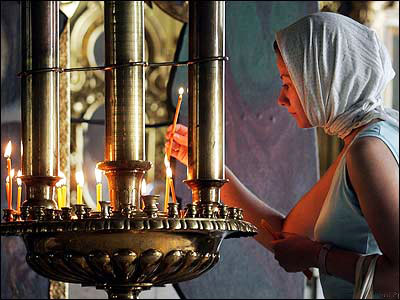
DIOCESE OF EASTERN AMERICA AND NEW YORK: July 8, 2008
"The Place of Women in the Orthodox Church": A Conference at Intercession Church
 Fifty percent of the success of any conference can be attributed to its organizers being excited by the chosen theme. One can state unequivocally that the organizers of the conference held from June 20-21 at the Church of the Intercession of the Holy Virgin in Glen Cove, NY, were eager to answer the question: "How can the women serve the Church in today's world and what preconceived notions hinder such service?" Fifty percent of the success of any conference can be attributed to its organizers being excited by the chosen theme. One can state unequivocally that the organizers of the conference held from June 20-21 at the Church of the Intercession of the Holy Virgin in Glen Cove, NY, were eager to answer the question: "How can the women serve the Church in today's world and what preconceived notions hinder such service?"
The Conference opened with a greeting from His Eminence Metropolitan Hilarion, in which the Primate of the Russian Orthodox Church Outside of Russia pointed to the importance of appreciating the role and service of women in the Orthodox Church. Women were the ones who historically, beginning with the Holy Myrrh-bearers and Equal-to-the-Apostles, bore a significant burden of service to the Church, whether on the kliros, the sisterhood, parish councils and schools, hospitals, nursing homes or scholarly conferences.
Professor Vera Shevtsoff of Smith College spoke on the topic of the laudation by women of the Most-Holy Mother of God in Russia. SI Snesareva, who corresponded with St Ignatius (Brianchaninov) in the 19th century during a period of aggressive nihilism, understood how the biography of the Most-Holy Mother of God should be composed; that it should be palatable to her contemporaries. Later, under the reign of atheism, it was women who preserved and passed on the stories of the origins and miracles of the many icons of the Most-Holy Mother of God.
Professor Marina V Ledkovsky of Columbia University gave a speech on her experiences working with the deans of St Vladimir's Seminary, Fr. George Florovsky and Fr Alexander Schmemman, who, while admiring the external forms of church customs, paid special attention to preserving their essence. Prof. Ledkovsky shared her thoughts on the fact that often, women might find the observance of traditions as a hindrance in liturgical life. For example, on Great Saturday, women must often tend to housework at the expense of attending divine services.
 Eugenia Temidis, a researcher of Orthodox liturgical singing, read a lecture on St Cassia (9th century), a defender of the veneration of icons, whose spiritual life is forever remembered during the divine services of Passion Week and the Nativity of Christ. Elaborating on the "liturgical" image of St Cassia through her poetical works, written in the classical style, the speaker painted a convincing, living image of a person who lived an intense spiritual and intellectual life. Eugenia Temidis, a researcher of Orthodox liturgical singing, read a lecture on St Cassia (9th century), a defender of the veneration of icons, whose spiritual life is forever remembered during the divine services of Passion Week and the Nativity of Christ. Elaborating on the "liturgical" image of St Cassia through her poetical works, written in the classical style, the speaker painted a convincing, living image of a person who lived an intense spiritual and intellectual life.
The central event of the conference was the speech of Archimandrite Robert Taft, Professor of Eastern Liturgy at the Pontifical Oriental Institute, the world's leading specialist in the Orthodox liturgy. Reconstructing the place of women in the church life of Byzantium, Fr Robert noted that until the 10th century, one finds references to "deaconesses" as an institution. In ancient times, women were allowed to administer the Holy Gifts to others. Limitations for women in connection with church service must be viewed in context with general restrictions placed not only upon the laity but even upon the emperor himself. In his speech, which was exceptionally respectful to the Orthodox Church, Fr Robert stressed that the Church is first of all a Christian community, and not an association of clerics. The organized service of women could very much help today's world, which suffers greatly from its loss of faith.
A more mixed reaction was elicited by a serious theological examination by Nun Vassa (Larin), a student of Prof. Taft, on ecclesiastical rules on the "impure" times in a woman's life. Sister Vassa's bold presentation posed the question: "is a person morally responsible for the period of cleansing, and to what extent does the corresponding prohibition from participation in liturgical life draw one closer to God?"
Professor Nadieszda Kizenko of SUNY Albany spoke on the concept of confession for women in Tsarist Russia, painting a picture of harsh social injustice, helping to grasp a sober, Orthodox attitude towards repentance, and also to understand that one's way of life's inseparable from one's sinfulness.
Natalia Ermolaev, doctoral candidate at Columbia University, delivered a lecture on the social service of women, which proved a revelation for many listeners. They learned that in our time there are Orthodox Christians who actively follow the testaments of the Savior and care for "these little ones" (Matthew 10:42). In North America there are a number of Orthodox societies formed to help the needy, among which is the renowned International Orthodox Christian Charities (www.iocc.org). Addressing the danger of feminism, the speaker, referring to the Orthodox theologian Elizabeth Behr-Sigal, explained that in feminism, women lock themselves into their own midst, abandoning their calling to work for humanity at large.
Each day of the gathering began with morning and ended with evening prayers. The Diocesan Holy Myrrh-bearer's Women's Choir, under the direction of Eugenia Temidis, sang all-night vigil and Divine Liturgy on the feast day of All Saints in English for the first time. It is important to note the efforts of the organizers of the Conference: Fr Alexander Antchoutine, the Rector of Intercession Church; Catherine Straut; Catherine Mickle; and Natalia Fekula, along with all the parishioners, who warmly welcomed the conferees.
The most valuable part of the Conference were the fruitful discussions on uncomfortable matters such as the ordination of women, the degree of their participation in the conciliar life of the Church, the relevance of the 16th-century compendium "Domostroy," etc. The Conference's two days showed that in addition to the fifty-percent that the organizers' enthusiasm contributed to its success, another 45 percent or so was attributable to the participation of the conferees. The Conference, without reaching a final conclusion on the questions, still illuminated the problems addressed, which began a dialog. This was a clear example of the striving of the people of God towards conciliarity, and was a sign of a new period in the life of the Russian Orthodox Church Outside of Russia, which moves from the preservation of Holy Tradition as its main goal to developing its meaning.
AV Psarev

|